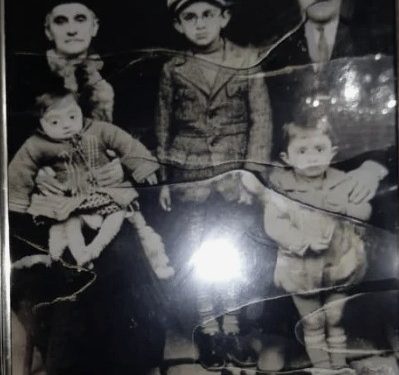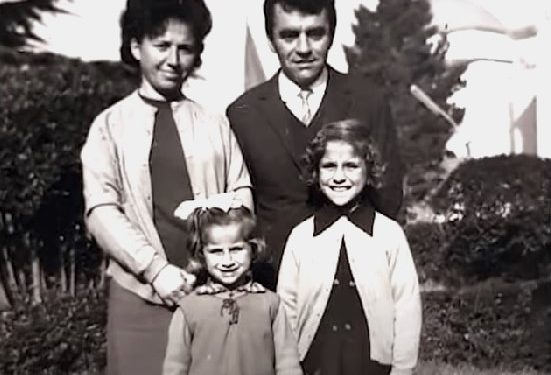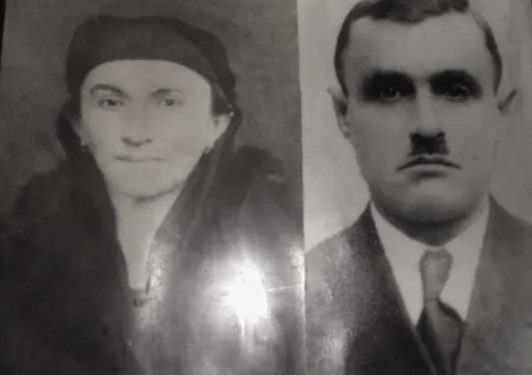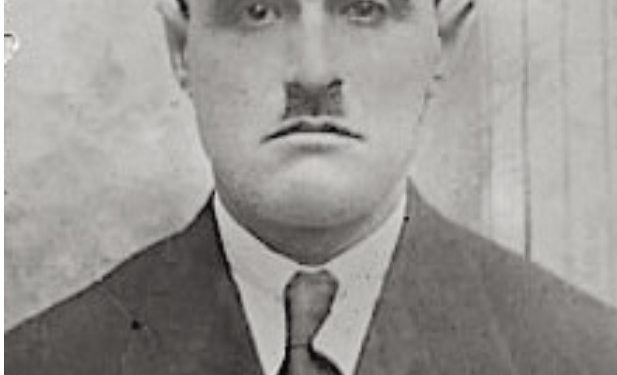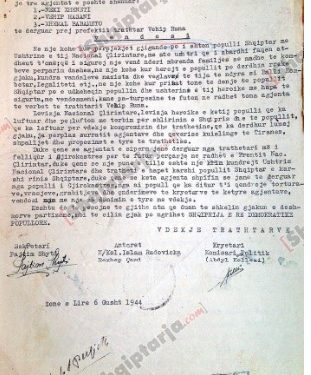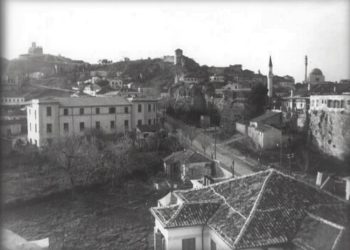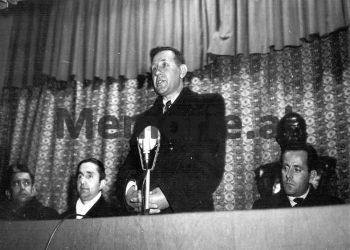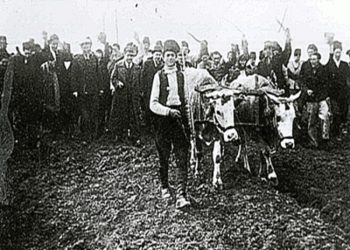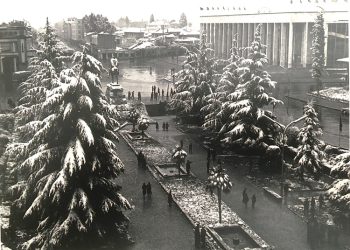Memorie.al / “Ambasciatore non porta pena” – says a well-known Italian proverb, “the envoy is not punished,” but on the contrary, the communist terror spared them none. The event in question took place on August 16, 1944. The execution of the Gjirokastër delegation, which went under a white flag during the Second World War, is a unique case, not only in Albania and the Balkans, but even further afield. The murder of this delegation was by no means “the work of hotheads,” but an already defined line within the Communist Party, where by monopolizing the ideal of the struggle for freedom, they would turn it into a fratricidal civil war, striking every point of view, every free thought, and every attempt at the birth of an opposition right during the war.
Neki Xheneti was born in the city of Gjirokastër on January 21, 1881. Following the family tradition, he, like his ancestors, completed his university studies in Law in Istanbul, together with Mehdi Frashëri. He came from a well-known intellectual family from Gjirokastër with considerable wealth, owning lands, pastures, estates, and shops, not only there but also in Delvinë and Vlorë, and his ancestors came from the autochthonous Gjirokastër family, Gjergjaj.
The change of the surname from Gjergjaj to Xheneti happened precisely in the first half of the last century, by the residents of the areas of Paramithia (Greece), and this was a sign of deep honor and gratitude for the act of charity of building a bridge over the Grebene River, by his great-grandfather, Mustafa Gjergjaj (Xheneti), whose humanitarian gesture, in favor of the population, astonished even the notable people of that city.
Lawyer Xheneti, in 1912, although young, was involved in the Independence movement, while in 1914; he was a member of the Albanian side’s Commission for defining the southern borders of Albania, according to the London Ambassadors’ Conference. In 1920, he participated in the Vlora War, in the capacity of the President of the Court.
Lawyer Neki Xheneti spent his entire career, until the end of his life, in Vlorë, far from his birthplace and family, in the free profession of a lawyer, where he had a great reputation as a distinguished lawyer, as a man of rare character and bravery, who wore not only a suit and a frock coat but also a woolen cloak (guna) and breeches (bruci). He loved the coastal city so much that he had started building a house to bring his family, who still lived in Gjirokastër, there, as in Vlorë, he had not only his law office but also his economic assets and interests, where he had invested the fruits of his profession, such as: houses, lands, and estates in the city and surrounding areas.
In the winter of 1944, Neki Xheneti returned to Gjirokastër, after his only brother, lawyer Xhevdet Xheneti, shaken by the red terror of the communists, which was exerted there during the massacre of November 18-19, 1943, which physically eliminated nationalists and innocent people, plundered, burned, and destroyed many houses and buildings, suffered a heart attack, which later took his life.
Av. Nekiu had previously gone to Tirana, where he had met and talked with Mehdi Frashëri and other intellectuals about the difficult situation that Southern Albania was experiencing, with destitution, violence, psychological terror, and the lack of communication links, not only with Tirana, but also with Tepelenë, Përmet, and Vlorë.
After many vicissitudes, he arrived in Gjirokastër from Greece, failing to find his only brother alive. After waiting for days for condolences for his untimely loss, his first visits in the city were precisely to the families of nationalists executed by the communists.
In the winter of 1944, lawyer Xheneti found Gjirokastër in chaos, insecurity, anxiety, and a severe economic state, and sharp social and psychological tension. Therefore, together with many notable men of the city, in March 1944, he created a Commission for the Administration of the City, where the main issues were; problems of city supply, organization of assistance for the poor and refugees, collection of aid for the hospital, establishment of order and peace, etc.!
The Commission, headed by lawyer Xheneti, who became one of the most popular figures in the city, rejected the communists’ interference for manipulation and threw out the red commissar, Haki Toska, for the pressure he exerted on him.
In such a critical situation, to make communication between the villages and the city possible, as the city was threatened by hunger, because Gjirokastër was under an iron grip, isolated in every direction, and to cut off the path to bloodshed, at the meeting of the people’s representatives in the Teqe mosque, the Commission for the Administration of Gjirokastër, under the approval of the entire community, chose another delegation, following the first mission that had just returned from Zagori.
The delegation had to go again and hold talks with the Headquarters of the First Operational Zone of Enver Hoxha’s National Liberation Army, in Nderan of Zagori, to coordinate actions and reach an agreement for cooperation, avoiding fratricide, as any further military action would bring (as happened later) destruction, burning, reprisals, and completely meaningless victims.
They knew that the communists were treacherous; they did not forget that the red executioners kidnapped and took their fellow citizens from their homes, killing and massacring them in the streets of the city, but the difficult situation, the honor of the city and the homeland, called on them to undertake such a mission.
The three men, respectfully escorted by thousands of citizens, mounted their horses and appeared at the Headquarters of the First Operational Zone Vlorë–Gjirokastër, centered in Zagori. Unarmed, calm, they were the true nationalists of Gjirokastër, uninvolved in any political party: lawyer Neki Xheneti, Vehip Hasani (60 years old – a big merchant), and Xhemal Babameto (52 years old – a merchant).
The leaders of the Headquarters received them coldly, not respecting them as a delegation with the mandate of representing the people, and conducted the discussions outside of any ethics, under constant threat. The extremely humane and nationalist purpose of the mission was interpreted by the Headquarters of the 1st Operational Zone Vlorë-Gjirokastër as; “discord, crime against the National Liberation Army, and open treason against the Albanian people and Albanian youth.”
The tolerance and argumentation of the issues presented with wisdom and maturity by the nationalist delegation were opposed by communist brutality and megalomania, accusing them of being dividers and saboteurs of the National Liberation War, and, not accepting any alternative in the talks, they were arrested and imprisoned afterward, in the house of the villager Kalo Gjoni, where partisan guards surrounded the house and kept watch, so that no one could approach the place where the prisoners were held.
Following the delegation’s insistence on its mission, the Headquarters of the First Operational Zone attempted intrigue and division, singling out and pressuring Vehip and Xhemal to distance them from lawyer Neki Xheneti, and to use it later as an excuse that they themselves were sold out and divided among themselves, let alone about the interests of the nation!
But they were true patriots and refused to betray the mission and did not abandon each other, even though the pressures and blackmails continued for days and their lives were at risk.
When everything was rolling towards the tragic end, they handed over a letter, leaving their last wishes, and with it, their personal belongings (gold watches, rings, glasses, and fountain pens), and relics that years later, Gjirokastër residents saw in the hands of Islam Radovicka and Abdyl Këllezi.
On August 16, 1943 (Note: The article states the event happened on Aug 16, 1944 at the start, but then Aug 16, 1943 here), in the afternoon around 4:00 PM, lawyer Neki Xheneti and his two comrades, tied with parachute rope and accompanied by a cordon of partisan guards, were taken to the place of execution, lined up opposite the open pit (their common grave), where the entire delegation was publicly shot in the village of Nderan of Zagori, and they bravely and courageously, without flinching at all, shouted: “No Communism! Long live Albania!”
Afterward, the partisans who were assigned to their execution searched them, taking their suits, shoes, socks, etc., a very disturbing sacrilege, before throwing them into the pit opened specifically for them. This macabre murder deeply shocked the human souls of that area, so much so that all the people present there left terrified.
Surprisingly, after this scene, a thin rain began to fall and the village fell into deep silence, as the residents of Nderan saw such a macabre and horrifying scene for the first time.
(It is more than understandable that the capital punishment of this delegation was carried out by the order of their fellow citizen, Enver Hoxha, who was near Zagori those days, in Odriçan of Përmet, confirmed by Haki Toska, who in a meeting he had in April 1988 with Neki’s son, Professor Luan Xheneti, told him: “You must be clear that your father and the entire delegation were executed by order of Enver Hoxha”).
The terrible incident immediately spread in Gjirokastër, due to its nature, but also due to the great weight of the pain. This event was also reported with indignation at the time by two Greek newspapers in Ioannina, which publicly denounced the treachery of the communists who even killed delegations.
Exactly one year later, the victims’ relatives came and retrieved their bodies, still unrotted, because, as is said in these cases, such actions are not even absorbed by the earth.
For nearly half a century, the communist dictatorship labeled the three of them as; “war criminals, enemies of the people,” not only confiscating all their assets but going even further by persecuting and interning their families (in Bulqizë, etc.).
Bolshevik hypocrisy reached its peak when, in a document sent to the Party Committee in November 1969, Hysni Kapo stated: “They were killed as passers-by, it is not known who shot them on the road.”
How hypocritical these statements were is proven by the fact that; not even one correction was made in the political treatment of the members of these families, hitting them hard with the “class struggle,” not only his three sons but also his grandsons and granddaughters.
In the article dated December 22, 2017, in the newspaper shqiptarja.com, journalist Admirina Peçi writes precisely this about this event:
“The partisan trials held under wartime circumstances are known as one of the criminal levers with which the communists acted to eliminate their political opponents during the war years. Often, the trials took place within a short time, and the sentencing and execution by firing squad were even carried out within the day. In these trials, evidence and witnesses were almost always missing; in the most frequent cases, they gave false testimonies or were prepared beforehand, according to a specific scenario.
Today we will bring readers a document that proves this best. The decision of the partisan court we are talking about was made on August 6, 1944. After it, three people were taken to be executed by firing squad, without any evidence, except for the fact that the partisans, improvised as judges, thought they were traitors. The condemned to execution by firing squad were: Av. Neki Xheneti, Vehip Hasani, and Xhemal Babameto, who were accused of joining the ranks of the National Liberation Army as agents to sow division.
With this accusation, they were sentenced to death by the partisan court. Below we bring the full decision of this court, signed by the secretary Pajtim Shyti, members N/Col. Islam Radovicka and Rexhep Çami, and the chairman of the court, Abdyl Këllezi.”
From the memoirs of my father, Professor Luan Xheneti, who began the honored profession of a teacher in the anti-illiteracy courses when he was still 16 years old in the mountains of Kuç, finished his university studies at the Faculty of Philology in Tirana with excellent results, and was then appointed Professor of Literature at the newly opened high school in Kavajë, where in 1967, he was fired, being accused as a; “bourgeois academic,” due to the class struggle. /Memorie.al




